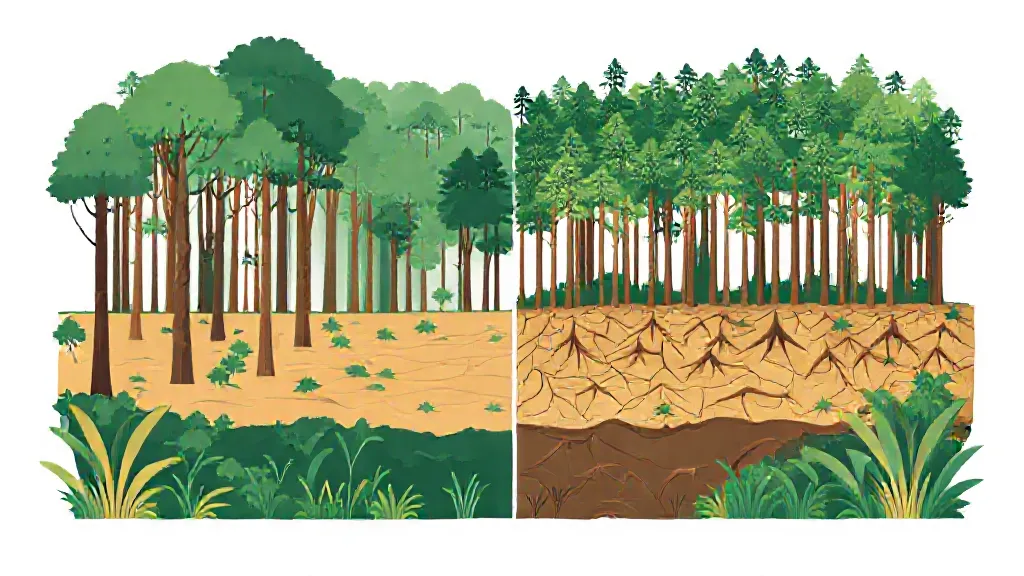Deforestation, the large-scale removal of trees from forested areas, has been a significant environmental issue over the past century. This phenomenon not only contributes to climate change but also leads to a cascade of long-term effects on ecosystems, biodiversity, and human livelihoods. As forests are cleared for agriculture, urban development, and logging, the repercussions extend far beyond the immediate loss of trees.
Understanding these long-term effects is crucial for developing effective conservation strategies and policies.
Ecological Consequences of Deforestation
One of the most immediate ecological impacts of deforestation is the loss of habitat for countless species. Forests are home to approximately 80% of the world’s terrestrial biodiversity.
When trees are removed, the intricate web of life that relies on these ecosystems is disrupted. Species that depend on specific habitats may face extinction, leading to a decline in biodiversity. For instance, the Amazon rainforest, often referred to as the "lungs of the Earth," is experiencing significant species loss due to deforestation, threatening not only local wildlife but also global ecological balance.
Impact on Climate Change
Deforestation significantly contributes to climate change, primarily through the release of carbon dioxide stored in trees. When forests are cut down, the carbon stored in the biomass is released into the atmosphere, exacerbating the greenhouse effect. According to the Intergovernmental Panel on Climate Change (IPCC), deforestation accounts for nearly 10% of global greenhouse gas emissions.
The long-term impact of this is a rise in global temperatures, resulting in unpredictable weather patterns, increased frequency of extreme weather events, and rising sea levels, which threaten coastal communities.
Soil Degradation and Erosion
The removal of trees also leads to soil degradation and increased erosion. Trees play a vital role in maintaining soil structure and fertility.
Their roots anchor the soil, preventing it from being washed away during heavy rains. Without this natural barrier, deforested areas become prone to erosion, leading to loss of arable land and increased sedimentation in rivers and streams. This sedimentation can harm aquatic ecosystems and disrupt local water supplies, further complicating the long-term effects of deforestation.
Effects on Indigenous Communities
The long-term effects of deforestation extend to human communities, particularly indigenous populations that rely on forests for their livelihoods. Many indigenous groups have lived in harmony with forest ecosystems for centuries, utilizing them for food, shelter, and cultural practices. Deforestation disrupts their way of life, often leading to conflicts over land rights and resources.
The loss of traditional knowledge and cultural heritage is a significant consequence, as these communities are displaced and their ancestral lands are destroyed.
Economic Implications of Deforestation
Economically, deforestation can have both short-term gains and long-term losses. While clearing forests can provide immediate profits from timber and agricultural products, the long-term economic impacts can be detrimental.
The loss of ecosystem services, such as clean water, pollination, and climate regulation, can lead to increased costs for society. Sustainable forest management practices can provide a more balanced approach, ensuring that economic needs are met without compromising environmental integrity.
Restoration and Reforestation Efforts
In response to the long-term effects of deforestation, various restoration and reforestation initiatives have emerged worldwide.
These efforts aim to restore degraded ecosystems, enhance biodiversity, and mitigate climate change. Programs such as the Bonn Challenge, which aims to restore 150 million hectares of deforested and degraded land by 2020, exemplify global commitment to addressing this issue. Successful restoration not only benefits the environment but also provides economic opportunities for local communities through sustainable land use practices.
The Role of Policy and Education
Effective policy and education are critical in combating the long-term effects of deforestation. Governments, NGOs, and international organizations must work together to create and enforce laws that protect forests and promote sustainable practices. Education plays a vital role in raising awareness about the importance of forests and the consequences of deforestation.
By empowering communities with knowledge and resources, we can foster a culture of conservation that prioritizes the health of our planet.
Conclusion: A Call to Action
The long-term effects of deforestation are profound and far-reaching, impacting ecosystems, climate, and human societies. As we continue to confront these challenges, it is essential to adopt sustainable practices and prioritize forest conservation.
The future of our planet depends on our ability to recognize the interconnectedness of all life and take decisive action to protect our forests for generations to come.
